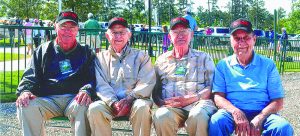
This World Is Not My Home
An excerpt from Lost Places: On Losing and Finding Home
By Cathryn Hankla
Mother, a pirate, lying on the living room couch where children seldom roamed much less sat; I wasn’t used to seeing her prone; usually, she was industrious with homemaking chores unless sunbathing with a book propped on her lap. A white gauze patch covered one eye. She had had a mole removed from her eyebrow. I had noticed the dark speck of flesh — a dark eraser sprouted and splayed the brows around it — but I didn’t know its fate until it had already met the scalpel. Now it looked like she had lost her eye, and she promised me there were a number of stitches. The doctor’s bulky bandage and tape straps extended around her nose, down her cheek and over her forehead. Ahoy. It was a lot of to-do over a dark dot.
I asked if it hurt. “Not much,” she said. “But I’m taking a nap.”
I asked if I could see the stitches when she woke up. “When I change the bandage,” she said. I was squeamish about needles but loved the concept of first-aid, or maybe it was the kit I loved, the organized compartments of bandages and ointments.
A dark dime marks the back of my upper left thigh. When I was a child the proportions made it appear to be worth more, closer to a quarter-sized polka dot on my skinny leg. At the swimming pool people sometimes stared at the brown spot of concentrated melanin, but it was always behind me as I ran, and growing up I didn’t much care. I was dragged to the pediatrician at least twice a year, and during each routine visit my mother asked about the removal of my birthmark. My pediatrician remained blasé.
A classmate at the college swimming pool told me, mincing no words, that I was going to die of cancer. My spotted leg was propped up on a railing as I lazily surveyed the pool for my work-study job as a lifeguard. “It’s a birthmark,” I said. The young woman assured me that I could still die. I was 19 with a plastic whistle hanging between my breasts.
Sealing the deal, she said, “My father is a doctor.”
I grew up with a lot of doctors’ kids and they were sometimes paranoid, exposed to bad news and hushed tones on a regular basis. But all that sickness made them richer than regular kids.
My dad was a medicine man; he dispensed pills, although when he first passed the state board he also mixed, compounded and did some prescribing of controlled substances. He knew the chemical origins of most drugs and their botanical bases, and I imagined back to the rain forest, whence he told me aspirin derived, from the bark of a certain tree. Some of his customers paid him in farm animals, once a black lamb. We lived in town, so this was a tactical problem: no barn, lamb in basement, grazing backyard. Even in Appalachia, this was not done. Mother remembers my father in the prescription department gently daubing to remove cinders from the eyes of miners who called him “Doc.” They couldn’t afford a real doctor.
Mother recently confessed that she’s stopped shaving beneath her arms and also stopped shaving her legs. “I can’t see to shave.” Her legs are nearly hairless now anyway. She tells me this while I am helping her pull a spandex camisole over her head. The shelf bra of the camisole catches on her chest above her flattened smudges of breast. As we work it down into place, I see the sprays of long gray hair stubbornly hanging on beneath what Mother calls her “little scrawny arms.” Neither does she wear bras most of the time. “Oh well,” Mother says, letting go of one more thing.
In my teens and 20s I had several tall friends. I never really understood how short I was by comparison until I’d see a photo, a group shot in which I looked stunted, standing as tall as possible. The tall girls looked better in their outfits no matter what they wore. I still remember the hour, the minute my father turned to me without prelude and announced that he had just realized he was short. “Cathy,” he said, “I’m a short man.” He was 75 at the time. He waited for my reaction. “Yes,” I said, “I know.” Some part of him fell silent, stunned. Even I already knew.
My feet have always been small, even in army boots they look dainty. Up until the fifth grade I thought they would grow, but instead they decidedly stopped short. My grandfather shook his head, looking down at my feet, “You’ve got to have a firm foundation in this world.” Maybe he had seen what happened with livestock back on the farm in Seven Mile Ford he couldn’t wait to leave, or with mongrels whose puppy paws indicated the eventual size of the dog. Maybe he knew what to expect from me. My grandmother Bonnie, whom everyone called by her first name, never reached five feet in shoes. All of us grandchildren passed her one by one, pressing our backs to hers, and then we were gone. I passed her quickly because she was already shrinking, aged 80 when I was 10. She wrapped her silver hair into a bun and pinned a circular hairpiece over her bald spot. I used to deliver a paper bag when Mother and I shopped for her. One day I looked inside to find a pack of tall brown Virginia Slims and a pint of Virginia Gentleman.
I’m going through every drawer in Mother’s assisted-living bed sitting room, because she has been robbed. We’re checking as the facility manager has instructed, in case we have misplaced the hinged gold bracelet. While I perform this duty, I know we haven’t simply lost it. Just last week I shied from taking it home when Mother urged me to; now I’m kicking myself. In the center drawer of her dressing table I find a stash of half a dozen different pairs of tweezers. “Don’t get them mixed up,” Mother says. “Leave those where I can find them.” When I ask her if she wants to throw some of them away, she says no. I wonder how on earth my mother manages to tweeze in her 90s. Her bad eyesight has something to do with the brush fire she has made of her right eyebrow: a scorched forest with regenerating understory. Or maybe it’s the arthritis in her hands that has compromised her hand-eye coordination. Her fingers twist like bonsai.
I check the side drawer of the dressing table, and at the very back I pull out a scrap of white cotton fabric that looks like an old handkerchief until I unfold it, shake it loose, and find the shape of a smocked baby dress that’s been shortened with scissors to a tiny tunic.
“What’s this?” I ask. She says it was either mine, or my sister’s. “What do you want to do with it?”
“Leave it,” she says.
I stuff it back in the drawer next to one of my dad’s old T-shirts that I’ve already asked about. Mother insists on keeping it there.
A week goes by before I walk up to the Roanoke city police station to file a report. The woman at the window is very helpful in taking down the details. She also tells me that a few years ago on the nursing side of the same facility I have chosen with great care for my mother they had a male nurse or aide who was abusing the patients; I wish I didn’t know this. He’s in prison, “put away,” she tells me. The assisted living facility is running its own investigation, reviewing hours of surveillance tape to see who went in and out of Mother’s room. Since it seems like an inside job I doubt these tapes will yield more than the obvious schedule of baths, room cleaning and meals. Someone who takes care of my mother is a thief. This is troubling.
“It’s OK but it’s not home,” Mother says of her assisted living apartment. I can quote only one line from Shakespeare’s As You Like It. Touchstone: “Ay, now I am in Arden; the more fool I; when I was at home I was in a better place: but travelers must be content.”
Other things have been stolen from Mother’s room, a roll of quarters and some small gold cufflinks neither of us can sufficiently describe. Mother thinks the cufflinks were my father’s, who never wore cufflinks; a tiepin was absent from the set before the theft, and he probably did wear that. The address on the empty jewelry box reads Sixth Avenue. Dad could have bought these when he was a traveling salesman of party supplies with Benco, headquartered in New York City, or maybe his boss gave him an incentive. This was right after WWII when Dad was so anxious he couldn’t stand still to fill prescriptions and briefly became Willy Loman.
Upon receiving an encouraging letter from a niece about all of the activities she could enjoy at her new assisted living facility, Mother looked at me wryly and said, “It’s not summer camp.”
It’s amazing to me how much Mother managed to stuff into every drawer and closet of her condo, how many boxes from the last move she had failed to open, much less sort. She says the time got away from her, six years in an eye-blink. My mother is no hoarder and fairly unsentimental, yet it took me three solid weeks to construct some logic through my sorting, with piles to give away, seal into storage or distribute to distant family. At the same time, Mother is not yet dead, even though it felt like it some days when I dragged myself across the bridge to South Roanoke and entered her condo with my lunch bags of Chipotle. Just when I thought I could part with something, Mother would ask about it, and instead of pitching it toward the Rescue Mission pile, I packed it for the storage unit or delivered it to her new room where there was precious little display space.
Waiting inside kitchen cabinets were dozens of crystal and china pieces that Mother had not used since moving to the condo. Once disturbed from their drawers or shelves, these hidden treasures took on weight and expectation like an island of forgotten, guilt-tripping toys. Each item magnified by catching the light seemed to speak and say the same thing, “Take me with you.” Even colorful plastic cocktail stirs collected on my parents’ various vacation tours whispered the same plea as I dropped them into the trash. I made the mistake of looking more closely at the matchbook collection and kept several of them from the Mark Hopkins hotel in San Francisco, New York’s Americana, Caesars Palace and The Royal Hawaiian.
On the final day of packing and cleaning I pulled a heavy box from the back of the guest room closet and opened the top to find it stuffed with WWII mementoes, including my father’s portrait in dress whites, wearing the very epaulettes, stripes and stars I also found packed in the box. His discharge papers, too, a veritable museum of WWII. God’s eye watches my mother’s youngest child: I closed the lid again and taped it shut for storage without sifting all the way to the bottom. Some things cannot be excised or plucked from our lives. Some things we have to keep. Some love is without end.
Mother says, “Why am I still here? I can’t get any better and I don’t get any worse.” I have no answer . . . no “Spirit in the Sky” chorus for her. The body is a betrayer, not her home. No home is left. Her face contorts in pain. “For me,” I say. “You’re here for me.” I know she wishes she felt like staying. OH
From Cathryn Hankla, Lost Places, © Mercer University Press, 2018.xxxxxxxxx
Born in the Appalachian Mountains of Virginia, Cathryn Hankla is professor of English & Creative Writing in the Jackson Center for Creative Writing at Hollins University. Hankla has published over a dozen books of fiction and poetry, including Fortune Teller Miracle Fish: stories, Great Bear, Galaxies. Lost Places: On Losing and Finding Home is her first work of nonfiction.





